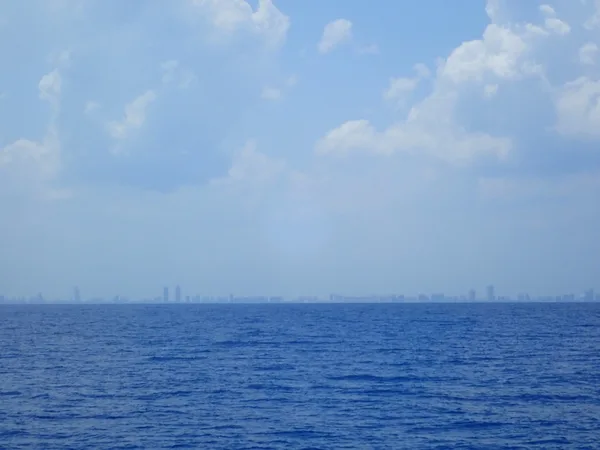Programs Blog
The Role of Ports in Decarbonization – Why Ports Need to Be Sustainable

Last Sunday, a skyline of skyscrapers came in and out of view from the haze. The vessel traffic was insane around us, including everything from small motorboats to enormous cargo ships visible in all directions. As we were sailing around the port of the Miami, the busy traffic was a constant reminder that 85% of the world’s cargo is transported by sea. With growing global trade, ports must increase their operational capacity, inevitablyleading to increasing energy demand. Most of that energy still comes from the burning of fossil fuels and leads to high greenhouse gas (GHG) emissions. Therefore, ports are making a considerable contribution to global climate change.
Although port operations are not the first thing most people think of when climate change mitigation is mentioned, scientists are researching potential strategies to lower carbon emissions and implement more sustainable operations overall. However, we were surprised to find that there is little academic research on port decarbonization in the United States. Despite the existence of government entities like the EPA and countless NGOs pushing for climate change mitigation, especially from the energy sector, little has been done to make our ports more sustainable. Not only is port sustainability important for reducing global climate change, but it is also critical for the health and wellbeing of local communities. People in port cities are impacted by pollution as well as the economic success of these ports.
There is no easy solution, as optimal port sustainability plans are unique to each port and depend on several factors including existing infrastructure, economic and political feasibility, and available technology. The major option is replacing fossil fuel-based energy sources with renewable energy, but not all renewable energy sources are necessarily suitable for any port. Some ports are conducting reviews of options available to them and trying to identify sources of renewable energy that would be most sustainable and cost-efficient for them.
A common option is offshore and onshore wind power, especially if the port is located in an area with high wind power potential. But taking into account the long process of wind farm approval which often takes years, it might not be the best option if we are aiming to achieve decarbonization of ports in a time-efficient manner. Solar energy is another popular option already used in some ports around the world. Research by Bergholz suggests installing solar panels on the roof of reefer areas in the port, using the energy obtained to support reefers and other electrified equipment (2014). At the same time, solar panels create a shadowed area for reefer containers and reduce energy needed for cooling.
There are many other components to consider for port sustainability including decarbonizing shipping as a whole and implementing lasting infrastructure. According to the International Transport Forum, shipping alone accounts for 2.6% of global GHG emissions, but this could triple by 2050 if measures are not taken to decarbonize (2018). Therefore, decarbonizing shipping plays an important role in decarbonizing ports themselves through better technology, fuel, and efficiency. It is also important to consider maintenance strategies and how to regulate the upkeep of infrastructure (Zhang et al., 2017). Finally, it is important to maintain communication between ports and their respective cities, as well as between different entities conducting research. There are gaps between different groups: environmental research is focused on pollution, economic research on investment and management, and social research on human resource management (Lim et al., 2019). It is important to align these different goals that so sustainability can become a feasible and attainable goal.
– Elena and Kira
Recent Posts from the Ships
- Ocean Classroom 2024-A collaborative high school program with Proctor Academy
- Collaborations and Long-term Commitments: SEA’s Caribbean Reef Program Sets a Course for Coastal Programs that Compliment Shipboard Experiences.
- Sea Education Association students prepare for life underway using state of the art nautical simulation from Wartsila Corporation.
- SEA Writer 2022, Magazines From the Summer SEA Quest Students
- Technology@SEA: Upgrades Allow Insight into Ocean Depths
Programs
- Gap Year
- Ocean Exploration
- High School
- Science at SEA
- SEA Expedition
- SEAScape
- Pre-College
- Proctor Ocean Classroom
- Protecting the Phoenix Islands
- SPICE
- Stanford@SEA
- Undergraduate
- Climate and Society
- Climate Change and Coastal Resilience
- Coral Reef Conservation
- Marine Biodiversity and Conservation
- MBL
- Ocean Exploration: Plastics
- Ocean Policy: Marine Protected Areas
- Oceans and Climate
- Pacific Reef Expedition
- The Global Ocean: Hawai'i
- The Global Ocean: New Zealand